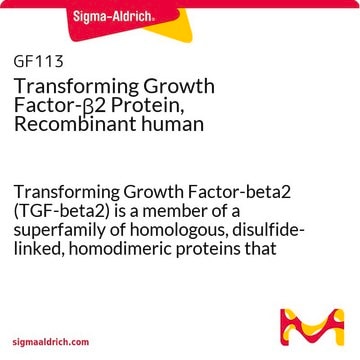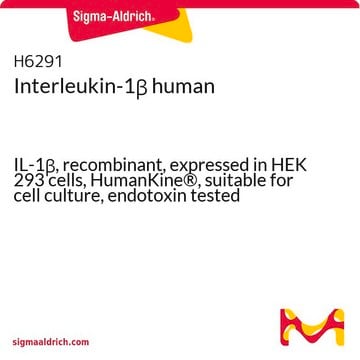H8666
Transforming Growth Factor-β2 human
TGF-β2, recombinant, expressed in HEK 293 cells, HumanKine®, suitable for cell culture
Synonym(e):
TGF-β2
About This Item
Empfohlene Produkte
Biologische Quelle
human
Qualitätsniveau
Rekombinant
expressed in HEK 293 cells
Assay
≥95% (SDS-PAGE)
Form
lyophilized powder
Wirksamkeit
≤0.5 ng/mL EC50
Qualität
endotoxin tested
Mol-Gew.
dimer 25 kDa (non-glycosylated)
Verpackung
pkg of 5 μg
Lagerbedingungen
avoid repeated freeze/thaw cycles
Methode(n)
cell culture | mammalian: suitable
Verunreinigungen
≤1 EU/μg
UniProt-Hinterlegungsnummer
Lagertemp.
−20°C
Angaben zum Gen
human ... TGFB2(7042)
Suchen Sie nach ähnlichen Produkten? Aufrufen Leitfaden zum Produktvergleich
Allgemeine Beschreibung
Biochem./physiol. Wirkung
Angaben zur Herstellung
Hinweis zur Analyse
Rechtliche Hinweise
Vergleichbares Produkt
Lagerklassenschlüssel
11 - Combustible Solids
WGK
WGK 3
Flammpunkt (°F)
Not applicable
Flammpunkt (°C)
Not applicable
Analysenzertifikate (COA)
Suchen Sie nach Analysenzertifikate (COA), indem Sie die Lot-/Chargennummer des Produkts eingeben. Lot- und Chargennummern sind auf dem Produktetikett hinter den Wörtern ‘Lot’ oder ‘Batch’ (Lot oder Charge) zu finden.
Besitzen Sie dieses Produkt bereits?
In der Dokumentenbibliothek finden Sie die Dokumentation zu den Produkten, die Sie kürzlich erworben haben.
Unser Team von Wissenschaftlern verfügt über Erfahrung in allen Forschungsbereichen einschließlich Life Science, Materialwissenschaften, chemischer Synthese, Chromatographie, Analytik und vielen mehr..
Setzen Sie sich mit dem technischen Dienst in Verbindung.




